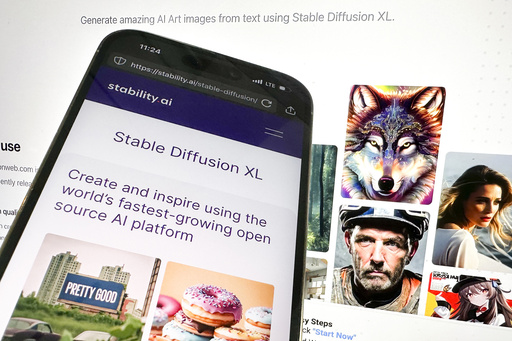Getty Images and Stability AI are locked in a landmark legal battle in a London courtroom, marking the first significant copyright trial concerning the generative AI industry.
The trial opened with arguments on Monday at the British High Court and is expected to continue for three weeks, with a written decision from the judge anticipated afterward.
Stability AI, headquartered in London, owns a popular AI image creation tool that garnered attention for producing AI-generated artwork and photorealistic images since its launch in August 2022. This release came shortly before OpenAI introduced its renowned chatbot, ChatGPT, which took the tech industry by storm three months later.
Getty Images, based in Seattle, has accused the development team behind the AI tool Stable Diffusion of engaging in “brazen infringement” on a vast scale by utilizing Getty’s extensive repository of photographs.
Tech firms often claim that “fair use” or “fair dealing” legal doctrines in the US and UK justify training AI systems using large datasets of images or texts. However, Getty was among the earliest to contest these notions by filing copyright infringement lawsuits in both countries in an early 2023 bid.
Craig Peters, CEO of Getty, previously emphasized the inappropriateness of Stability AI’s actions, asserting that permission should be sought from intellectual property creators before incorporating their work into AI systems, rather than relying on an opt-out system.
During Monday’s court proceedings, Getty’s legal team clarified that the case does not signify a conflict between the creative and tech industries, advocating instead for these sectors to collaborate seamlessly as licensing creative works is crucial for AI’s progression.
Lindsay Lane, Getty’s trial lawyer, emphasized that the issue lies with AI companies like Stability AI who leverage these creative works without adequate compensation.
Lane articulated that the legal dispute centers on the “straightforward enforcement of intellectual property rights,” including copyright, trademarks, and database rights.
Getty Images acknowledges the potential benefits of the AI industry but insists that this does not permit AI model developers to trample over intellectual property protections, according to Lane.
Lane further criticized Stability for its indiscriminate need for images to fuel its AI model, paying no regard to their potential copyright status, presence of watermarks, or unsuitability for certain environments.
“This trial serves as a pivotal moment for addressing that reckless approach,” Lane concluded.
Stability’s legal team is set to present their arguments, asserting that Getty’s claims pose a fundamental threat to Stability’s business and the broader generative AI sector.
Moreover, Stability contends that the case does not rightfully belong in a UK court since the AI model’s training occurred using US-based Amazon computers, asserting also that a minimal fraction of its AI-generated images bear resemblance to Getty’s works.
Upon trial conclusion, the judge’s decision is not anticipated to grant the AI sector its desired broader copyright exemptions for AI training, explained Ben Milloy of law firm Fladgate, uninvolved in the case.
Nevertheless, this case could influence commercial negotiations for content licensing deals globally, affecting both rights holders and AI developers.
Comparable legal battles in the United States have yet to undergo trial proceedings.
Despite its early challenges, Stability has encountered difficulties capitalizing on its tool’s acclaim, facing lawsuits, misuse, and other operational hurdles.
The origins of Stable Diffusion trace to collaborations between computer scientists at Germany’s Ludwig Maximilian University of Munich and New York-based firm Runway, with Stability AI contributing significant computational resources for training the models.
Stability later accused Runway of prematurely releasing a version of Stable Diffusion that was misused for harmful content, although it has since assured exclusive control over newer model versions.
In recent developments, Stability secured substantial investments from new backers, including Sean Parker, former Facebook president and co-founder of music platform Napster, known for its notorious copyright disputes.
James Cameron, famed director of “Titanic” and “Avatar,” is also a board member at Stability.
These investments followed the departure of Stability’s founder Emad Mostaque and several lead researchers who went on to establish a rival AI image generating startup, Black Forest Labs, in Germany.
Home Getty vs. Stability AI: UK Copyright Trial's Big Test



